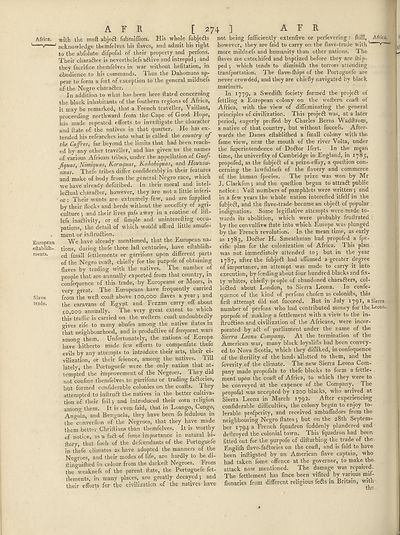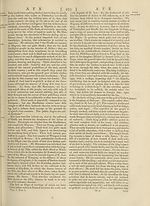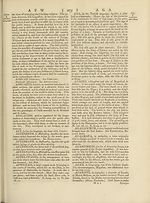Encyclopaedia Britannica, or, a Dictionary of arts, sciences, and miscellaneous literature : enlarged and improved. Illustrated with nearly six hundred engravings > Volume 1, A-AME
(302) Page 274
Download files
Complete book:
Individual page:
Thumbnail gallery: Grid view | List view

A F R [ 274 ] A F R
Africa. the mod abjefl fubmiflion. His whole fubjefts
v ' acknowledge themfelves his flaves, and admit his right
to the abfolute difpofal of their property and perfons.
Their character is neverthelefs aftive and intrepid j and
they facrifice themfelves in war without hefitation, in
obedience to his commands. Thus the Dahomans ap¬
pear to form a fort of exception to the general mildnefs
of the Negro charafter.
In addition to what has been here dated concerning
the black inhabitants of the fouthern regions of Africa,
it may be remarked, that a French traveller, Vaillant,
proceeding northward from the Cape of Good Hope,
has madeL repeated efforts to inveffigate the character
and date of the natives in that quarter. He has ex¬
tended his refearches into what is called the country of
the Caffres, far beyond the limits that had been reach¬
ed by any other traveller, and has given us the names
of various African tribes, under the appellation of Guef-
fquas, Nimiquas, Koraquas, Kahobiquas, and Howzou-
nnas. Thefe tribes differ confiderably in their features
and make of body from the general Negro race, which
we have already deferibed. In their moral and intel-
leftual char after, however, they are not a little inferi¬
or 1 Their wants are extremely few, and are fupplied
by their flocks and herds without the neceffity of agri¬
culture *, and their lives pafs away in a routine of lid-
lefs inaftivity, or of Ample and unintereding occu¬
pations, the detail of which would afford little amufe-
ment or indruflion.
European We have already mentioned, that the European ria-
eftablifli- tions, during thefe three lad centuries, have edablilh-
ments. ecj fma]| fettlements or garrifons upon different parts
of the Negro coad, chiefly for the purpofe of obtaining
daves by trading with the natives. The number of
people that are annually exported from that country, in
confequence of this trade, by Europeans or Moors, is
very great. The Europeans have frequently carried
Slave from the wed coad above 100,000 daves a year 5 and
trade. t}ie caravans of Egypt and Fezzan carry off about
i.0,000 annually. The very great extent to which
this traffic is carried on the wedern coad undoubtedly
gives rife to many abufes among the native dates in
that neighbourhood, and is produftive of frequent wars
among them. Unfortunately, the nations of Europe
have "hitherto made few efforts to compenfate ffiefe
evils by any attempts to introduce their arts, thei'r ci¬
vilization, or their fcience, among the natives. Till
lately, the Portuguefe were the only nation that at¬
tempted the improvement of the Negroes. I hey did
not condne themfelves to garrifons or trading faflories,
but formed confiderable colonies on the coads. I hey
attempted to indrudl the natives in the better cultiva¬
tion of their foil 5 and introduced their own religion
among them. It is even faid, that in Loango, Congo,
Angola, and Benguela, they have been fo fedulous in
the converfion of the Negroes, that they have made
them better Chridians than themfelves. It is worthy
of notice, as-a fadt of fotne importance in natural bi-
dory, that fuch of the defeendants of the Portuguefe
in thefe climates as have adopted the manners of the
Negroes, and their modes of life, are hardly to be di-
dinguiffied in colour from the darked Negroes. From
the weaknefs of the parent date, the Portuguefe fet-
tlements, in many places, are greatly decayed j and
their efforts for the civilization of the natives have
not being fufficiently extenfive or per fevering : dill, Africa,
however, they are faid to carry on the flave-trade with 'f~m
more mildnefs and humanity than other nations. The
daves are catechifed and baptized before they are ffiip-
ped 5 which tends to diminilh the terrors attending
tranfportation. The dave-ffiips of the Portuguefe are
never crowded, and they are chiedy navigated by black
mariners.
In 1779, a Swediffi fociety formed the projeft of
fettling a European colony on the wedern coad ot
Africa, with the view of diffeminating the general
principles of civilization. This projeft w'as, at a later
period, eagerly preffed by Charles Berns Waddrom,
a native of that country, but rvithout fuccefs. After¬
wards the Danes edablifbed a fmall colony with the.
fame view, near the mouth of the river Volta, under
the fuperintendence of Doftor Ifert. In the mgan
time, theuniverfity of Cambridge in England, in 1785*
propofed, as the fubjeft of a prize-effay, a quedion con¬
cerning the lawfulnefs of the davery and commerce
of the human fpecies. The prize was won by Mr
J. Clarkfon ; and the quedion began to attract public
notice : Vad numbers of pamphlets were written ; and
in a few years the whole nation intereded itfelf in the
fubject, and the flave-trade became an objeft of popular
indignation. Some legiflative attempts were made to¬
wards its abolition, which were probably fruflrated
by the convulflve date into Avhich Europe was plunged
by the French revolution. In the mean time, as early
as 1783, Doftor H. Smeathman had propofed a fpe-
cific plan for the colonization of Africa. This plan
was not immediately attended to 5 but in the year
1787, after the fubjeft had affumed a greater degree
of importance, an attempt was made to carry it into
execution, by fending about four hundred blacks and fix-
ty whites, chiefly people of abandoned charafters, col-
lefted about London, to Sierra Leona. In confe¬
quence of the kind of perfons chofen as colonifts, this
fird attempt did not fucceed. But in July 1791, a Sierra
number of perfons who had contributed money for the Leona,
purpofe of making a fettlement with a view to the in-
druftion and civilization of the Africans, were incor¬
porated by aft of parliament under the name of the
Sierra Leona Company. At the termination of the
American war, many black loyalids had been convey¬
ed to Nova Scotia, which they difliked, in oonfequence
of the derility of the lands allotted to them, and the
feverity of the climate. The new Sierra Leona Com¬
pany made propofals to thefe blacks to form a fettle¬
ment upon the coad of Africa, to which they were to
be conveyed at the expence of the Company. The
propofal was accepted by 1200 blacks, who arrived, at
Sierra Leona in March 1792. After experiencing
confiderable difficulties, the colony began to enjoy to¬
lerable profperity, and received ambaffadors from the
neighbouring Negro dates ; but on the 28th Septem¬
ber x 794 a French fquadron fuddenly plundered and
dedroyed the colonial town. This fquadron had been
fitted out for the purpofe of didurbing the trade of the
Engliffi dave-faftories on the coad, and is faid to have
been indigated by an American flave captain, who
had taken fome offence at the governor, to make the
attack now mentioned. The damage was repaired.
The fettlement has fince been vifited by various mil-
fionaries from different religious fefts in Britain, with
the
£
Africa. the mod abjefl fubmiflion. His whole fubjefts
v ' acknowledge themfelves his flaves, and admit his right
to the abfolute difpofal of their property and perfons.
Their character is neverthelefs aftive and intrepid j and
they facrifice themfelves in war without hefitation, in
obedience to his commands. Thus the Dahomans ap¬
pear to form a fort of exception to the general mildnefs
of the Negro charafter.
In addition to what has been here dated concerning
the black inhabitants of the fouthern regions of Africa,
it may be remarked, that a French traveller, Vaillant,
proceeding northward from the Cape of Good Hope,
has madeL repeated efforts to inveffigate the character
and date of the natives in that quarter. He has ex¬
tended his refearches into what is called the country of
the Caffres, far beyond the limits that had been reach¬
ed by any other traveller, and has given us the names
of various African tribes, under the appellation of Guef-
fquas, Nimiquas, Koraquas, Kahobiquas, and Howzou-
nnas. Thefe tribes differ confiderably in their features
and make of body from the general Negro race, which
we have already deferibed. In their moral and intel-
leftual char after, however, they are not a little inferi¬
or 1 Their wants are extremely few, and are fupplied
by their flocks and herds without the neceffity of agri¬
culture *, and their lives pafs away in a routine of lid-
lefs inaftivity, or of Ample and unintereding occu¬
pations, the detail of which would afford little amufe-
ment or indruflion.
European We have already mentioned, that the European ria-
eftablifli- tions, during thefe three lad centuries, have edablilh-
ments. ecj fma]| fettlements or garrifons upon different parts
of the Negro coad, chiefly for the purpofe of obtaining
daves by trading with the natives. The number of
people that are annually exported from that country, in
confequence of this trade, by Europeans or Moors, is
very great. The Europeans have frequently carried
Slave from the wed coad above 100,000 daves a year 5 and
trade. t}ie caravans of Egypt and Fezzan carry off about
i.0,000 annually. The very great extent to which
this traffic is carried on the wedern coad undoubtedly
gives rife to many abufes among the native dates in
that neighbourhood, and is produftive of frequent wars
among them. Unfortunately, the nations of Europe
have "hitherto made few efforts to compenfate ffiefe
evils by any attempts to introduce their arts, thei'r ci¬
vilization, or their fcience, among the natives. Till
lately, the Portuguefe were the only nation that at¬
tempted the improvement of the Negroes. I hey did
not condne themfelves to garrifons or trading faflories,
but formed confiderable colonies on the coads. I hey
attempted to indrudl the natives in the better cultiva¬
tion of their foil 5 and introduced their own religion
among them. It is even faid, that in Loango, Congo,
Angola, and Benguela, they have been fo fedulous in
the converfion of the Negroes, that they have made
them better Chridians than themfelves. It is worthy
of notice, as-a fadt of fotne importance in natural bi-
dory, that fuch of the defeendants of the Portuguefe
in thefe climates as have adopted the manners of the
Negroes, and their modes of life, are hardly to be di-
dinguiffied in colour from the darked Negroes. From
the weaknefs of the parent date, the Portuguefe fet-
tlements, in many places, are greatly decayed j and
their efforts for the civilization of the natives have
not being fufficiently extenfive or per fevering : dill, Africa,
however, they are faid to carry on the flave-trade with 'f~m
more mildnefs and humanity than other nations. The
daves are catechifed and baptized before they are ffiip-
ped 5 which tends to diminilh the terrors attending
tranfportation. The dave-ffiips of the Portuguefe are
never crowded, and they are chiedy navigated by black
mariners.
In 1779, a Swediffi fociety formed the projeft of
fettling a European colony on the wedern coad ot
Africa, with the view of diffeminating the general
principles of civilization. This projeft w'as, at a later
period, eagerly preffed by Charles Berns Waddrom,
a native of that country, but rvithout fuccefs. After¬
wards the Danes edablifbed a fmall colony with the.
fame view, near the mouth of the river Volta, under
the fuperintendence of Doftor Ifert. In the mgan
time, theuniverfity of Cambridge in England, in 1785*
propofed, as the fubjeft of a prize-effay, a quedion con¬
cerning the lawfulnefs of the davery and commerce
of the human fpecies. The prize was won by Mr
J. Clarkfon ; and the quedion began to attract public
notice : Vad numbers of pamphlets were written ; and
in a few years the whole nation intereded itfelf in the
fubject, and the flave-trade became an objeft of popular
indignation. Some legiflative attempts were made to¬
wards its abolition, which were probably fruflrated
by the convulflve date into Avhich Europe was plunged
by the French revolution. In the mean time, as early
as 1783, Doftor H. Smeathman had propofed a fpe-
cific plan for the colonization of Africa. This plan
was not immediately attended to 5 but in the year
1787, after the fubjeft had affumed a greater degree
of importance, an attempt was made to carry it into
execution, by fending about four hundred blacks and fix-
ty whites, chiefly people of abandoned charafters, col-
lefted about London, to Sierra Leona. In confe¬
quence of the kind of perfons chofen as colonifts, this
fird attempt did not fucceed. But in July 1791, a Sierra
number of perfons who had contributed money for the Leona,
purpofe of making a fettlement with a view to the in-
druftion and civilization of the Africans, were incor¬
porated by aft of parliament under the name of the
Sierra Leona Company. At the termination of the
American war, many black loyalids had been convey¬
ed to Nova Scotia, which they difliked, in oonfequence
of the derility of the lands allotted to them, and the
feverity of the climate. The new Sierra Leona Com¬
pany made propofals to thefe blacks to form a fettle¬
ment upon the coad of Africa, to which they were to
be conveyed at the expence of the Company. The
propofal was accepted by 1200 blacks, who arrived, at
Sierra Leona in March 1792. After experiencing
confiderable difficulties, the colony began to enjoy to¬
lerable profperity, and received ambaffadors from the
neighbouring Negro dates ; but on the 28th Septem¬
ber x 794 a French fquadron fuddenly plundered and
dedroyed the colonial town. This fquadron had been
fitted out for the purpofe of didurbing the trade of the
Engliffi dave-faftories on the coad, and is faid to have
been indigated by an American flave captain, who
had taken fome offence at the governor, to make the
attack now mentioned. The damage was repaired.
The fettlement has fince been vifited by various mil-
fionaries from different religious fefts in Britain, with
the
£
Set display mode to:
![]() Universal Viewer |
Universal Viewer | ![]() Mirador |
Large image | Transcription
Mirador |
Large image | Transcription
Images and transcriptions on this page, including medium image downloads, may be used under the Creative Commons Attribution 4.0 International Licence unless otherwise stated. ![]()
| Permanent URL | https://digital.nls.uk/193135911 |
|---|
| Attribution and copyright: |
|
|---|
| Description | Ten editions of 'Encyclopaedia Britannica', issued from 1768-1903, in 231 volumes. Originally issued in 100 weekly parts (3 volumes) between 1768 and 1771 by publishers: Colin Macfarquhar and Andrew Bell (Edinburgh); editor: William Smellie: engraver: Andrew Bell. Expanded editions in the 19th century featured more volumes and contributions from leading experts in their fields. Managed and published in Edinburgh up to the 9th edition (25 volumes, from 1875-1889); the 10th edition (1902-1903) re-issued the 9th edition, with 11 supplementary volumes. |
|---|---|
| Additional NLS resources: |
|

